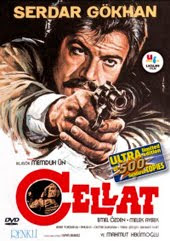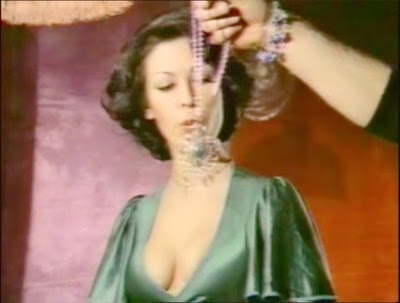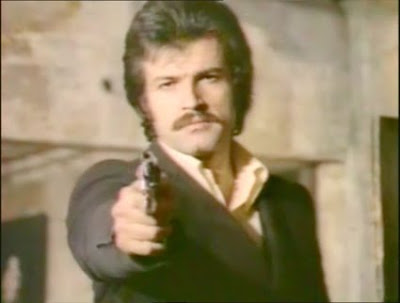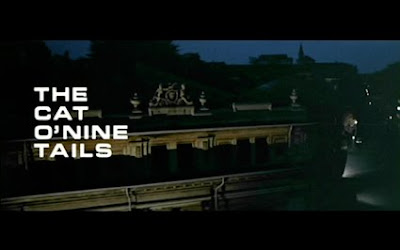

The Cat O’Nine Tails
Original Title: Il gatto a nove code
Directed by: Dario Argento
Italy/France/West Germany, 1971
Giallo, 112min
Distributed by: Anchor Bay
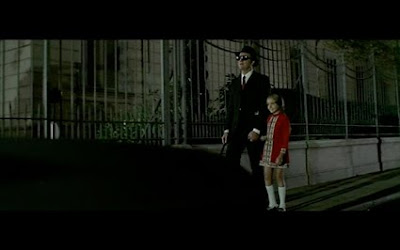
For some reason Il gatto a nove code (The Cat O’Nine Tails) 1971 often ends up in the middle or lower parts of most Argento fans lists. Sure with some twenty plus movies to his credit, it’s a tricky job arranging his films in any specific order. We all know which one’s we rate as his best movies, and we all know which ones we felt let down by… but with that said there’s several bloggers who are with a good measure of distance and time boldly revisited some of the lesser favourite movies and rediscovering them in a whole new light. I’ve decided to work my way through the catalogue methodically, step by step to see if I can reconnect and rediscover the progression of Dario Argento and see if the side steps really are as bad as I recalled them. In the meantime I recommend that you check out Ninja Dixon who has given three of the lower rated movies a new going over, and found some very interesting things in them. 
Franco Arno [Karl Malden], a old blind gent living together with his niece Lori, [Cinzia De Carolis – later to be seen in Antonio Margheriti’s epic Apocalypse domain (Cannibal Apocalypse) 1980] overhears a conversation where the word "blackmail" is spoken whilst walking past the Terzi Institute. I don’t know why but I’ve been convinced that it’s his niece for years – but paying attention to the dialogue, Arno has no family and she no parents…. Arno later finds out from cocky reporter Carlo Giordani [James Franciscus] that a burglar had tried to steal something from the institute. Soon after this discussion, doctors and other people connected to the institute start getting knocked off one by one. In a great scene one of them is even pushed in front of a train. One of Giordani's colleagues happens to shoot a few shots with his camera during the accident at the train station, thus revealing the killers identity (only to him though) evoking a sequence catching the context of Antonioni's Blow Up. Staying true to Giallo convention, as soon as the killer is close to being revealed he strikes again. Arno and Giordani team up and start putting the pieces together in their attempt to solve the mystery. After concentrating their investigations on the people connected with the institute, they look to the Institute itself and finally discover that the answer would cause great scandal if ever revealed…

The Cat O’Nine Tails is a rather so-so Argento movie, it get’s the job done but not much more. It’s tricky to see why this one often is referred to as being the movie that secured Argento the epitaph; The Alfred Hitchcock of Italy, as his first feature overshadows this one in all possible ways. And where The Bird with the Crystal Plumage was very obvious in whom its leading man was I find that The Cat O’Nine Tails suffers terribly from the device of two amateur detectives. It fails miserably and never really becomes clear who is the main lead character – Malden or Franciscus. There’s an apparent lack of motivation to solve the case more than simple curiosity, which is one of the weakest reasons, as there’s no real value at stake like in many of Argento’s other Gialli.

It also lacks the flair and elegance of that successful debut feature the year before. I get the feeling that the movie is in some ways was rushed into production and therefore suffers for it. Characters are shallow – sure Franciscus and Malden give great performances, but what’s up with the leading lady Katherine Spaak? It’s no doubt that she’s one of the most boring and stiff leading ladies in any Argento movie so far. Once again, and in many Argento movies to follow, good old Fulvio Mingozzi makes an appearance as a police detective, and the gay character Dr. Braun played by Horst Frank is miserably under used. What is it with Dario Argento and gay characters… there seems to be one popping up ever here and there, but never really making any specific imprint.

Finally the reveal of the killer who has hardly been part of the narrative throughout the movie at the very end of the movie is a trick that several other Gialli have used before and after The Cat O’Nine Tails, but when it comes to Argento one expects more, as he’s the one who commonly is referred to as the leading name of the genre. There’s nothing leading with convention.
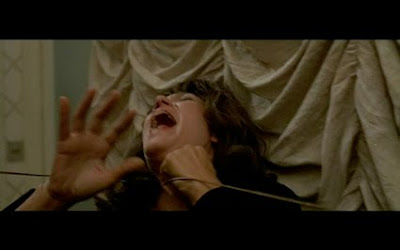
Within the Giallo genre there’s quite often scenes, clues and solutions that demand the audience to just accept what is going on without questioning. Stuff happens by chance, coincidentally characters will find something that will guide them forward in the quest, that vital clue that randomly lands in the grasp of the protagonist. I have a real problem with the fact that Arno – the blind man – is the one who on several occasions sees the clues, or rather “tells” Giordani where to look. It’s irritating that the blind man suggests that they look ”outside the cropped image” (read frame), as it is kind of strange that the blind guy should think of looking outside an image he cans see. There are several of these short, disclosed scenes with Arno, like the encounter in the cemetery, where he first fights off the killer but it all happens off screen whilst Giordanni is locked in the crypt. It’s not quite satisfying, and annoying to say the least – I watch Gialli because I want to be teased and part of the detective work, not to be kept in the dark.
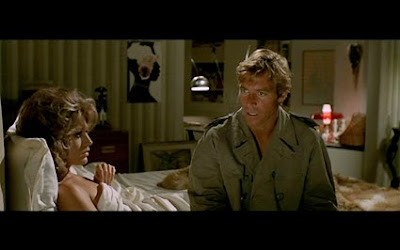
But at the same time the ”cropped image” is kind of interesting as the off screen space is where the killers in Gialli dwell, and it’s almost as if Argento this early on in the film decides to mock the conventions he would help to sustain. By opening up the frame he’d expose the killer, and also takes the opportunity to homage that great Antonioni movie Blow Up 1966, just like Sergio Martino did the same year with La coda dello scorpione (Case of the Scorpions Tail) 1971.

It strikes me that there are no Gialli character gloved hands at all in the movie, instead these images are replaces by the close-up of the killers eyeball instead. It’s odd to revisit a movie after such a long time only to discover that the trait very personal to Dario Argento is missing completely from the film.

The comic character – just like those found in the spaghetti westerns and definitely in many Argento movies – is also apparent in The Cat O’Nine Tails, this time in the guise of the police detective who can’t stop talking about his wife’s cooking and never manages to catch anyone’s attention.
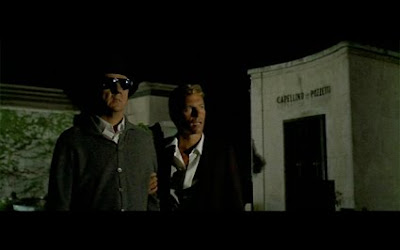
Then there’s that busting finale. The last act, from the vault’s under the cellar, the kidnapping of Lori and the final chase on the rooftops are some really fine moments, and almost make up for the pretty sloppy narrative up to that point. But don’t you feel that things move a bit too fast and then slam to a grinding halt? The killer is pushed down the elevator shaft and before he even hits the bottom the end credits start rolling… What happens to Giordani? Are Lori and Arno reunited? Etc etc. there’s a few questions that still are posed here and I don’t really find it satisfying that it’s ended where the killer is dead, as he was never the main driving force of the film, but Arno and Giordani where. You can’t have a scene where one of the two protagonists is knifed, beaten and left on the ground only to not give us a closure on that lead. It’s an irritating flaw that the movie never sorts out.

I’m pretty convinced that The Cat O’Nine Tails partially suffers from that bad rap as this is one of the films that Argento himself constantly states to like the least. It’s all too easy to follow him down that path and criticize the movie. Sure it does have some flaws, but at the same time does manage to entertain and pull me into the story even if I don’t really have a definitive character to root for.
Ennio Morricone’s score for The Cat O’Nine Tails is softer and gentler than the previous The Bird with Crystal Plumage, not to mention the frantic hard-hitting jazz score of 4 mosche di velluto grigio (Four Flies on Grey Velvet) 1971. Neither is Erico Menczer's cinematography anywhere near the splendid compositions and colour balance of Vittorio Storaro, but then again it does feature some interesting extreme close-ups of eyeballs, which is in suit with the exploratory imagery that soon would become Argento’s trademarks.

The Cat O’Nine Tails is the weakest of the three movies that make up the “animal” trilogy. It lacks several of the significant traits that are associated with Argento, and the characters are much more shallow than those before, and those to come. I can see why this one doesn't manage to make the same kind of imprint that other do. But it holds an interesting part in the lineage of Argento. It was the first movie that Dardano Sacchetti wrote, well the first he saw go into production at least, and the first collaboration between Argento and Sacchetti. It would take another sixteen years before the two worked on a movie together again, and that would be with Lamberto Bava’s Dèmoni (Demons) 1985. But as a team on an Argento movie the two would never work together again, perhaps because of the final result of The Cat O’Nine Tails. I can feel in some ways that The Cat O’Nine Tails may have grown some since I last saw it, but still is a weaker Dario Argento movie, and will forever be trapped between the impactful and impressive The Bird with Crystal Plumage and the ferocious for many years lost gem Four Flies on Grey Velvet 1971.
 Image:
Image:
Widescreen 2.35:1
Audio:
Dolby Digital 2.0, English, French or Italian dialogue available, English or French subtitles optional
Extras:
Interviews with Argento, Ennio Morricone and writer Dardano Sacchetti. Theatrical Trailers, Tv Spots, Radio spots and Poster/Stills gallery (does anyone watch these?). There’s also an interesting radio interview with Malden and Franciscus too.













